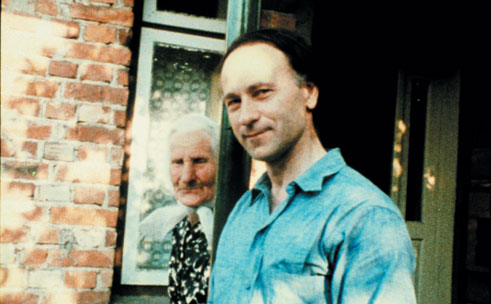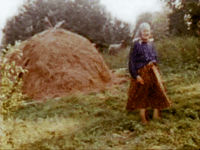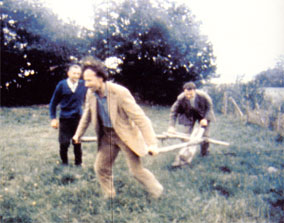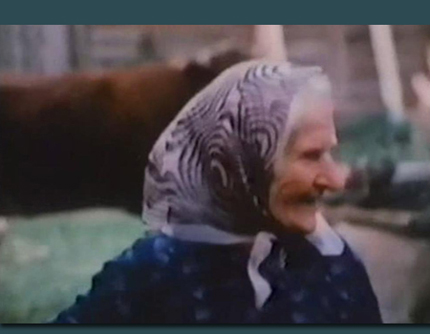One of my first published reviews, which appeared in the November 2, 1972 issue of The Village Voice, this was commissioned by Andrew Sarris, bless him. I was always grateful for this opportunity to write about a film that I love, and that I continue to cherish. — J.R.
Jonas Mekas’s Reminiscences of a Journey to Lithuania, a film dedicated “to all the displaced people in the world,” has itself become the object of some displacement. Screened jointly with Adolfas Mekas and Pola Chapelle’s Going Home at the New York Film Festival, defined in the program as a non-narrative film and by its author as a home movie, it has become a casual victim of “convenient” programing and somewhat deceptive labels. Whatever “non-narrative” and “home movie” mean — and I think the latter describes Going Home pretty accurately — they are less than helpful in describing the achievement of what must be called Jonas Mekas’s testament. If they must be understood, let it be understood that Reminiscences is a home movie about homelessness, a non-narrative film with one of the most beautifully constructed and articulated narrative lines in autobiographical cinema.
Going Home, a rambling collection of travel photos and family poses, resembles the jazzy surfaces of Hallelujah the Hills, joke titles and all, and registers not unlike a boastful list of possessions (the secret metaphysic behind every family album): this is my garden, my Moscow, my family, my Lithuania. A Gene Autry tune accompanies shots of Adolfas wrestling a calf, and a great point is made about the size of noses in the Mekas household. It all comes across somewhat like Gogol without the madness — that is to say, a lot like William Saroyan: much nostalgia, and tears jerked perhaps a little too freely, for the moisture quickly evaporates.
Reminiscences, on the contrary, exhibits a continual fight against nostalgia, despite an underlining effort to reconcile years and distances, and addresses the state of displacement and dispossession through the disciplines of its structure. It is frequently said that whatever happens in a movie occurs in the present tense; but unless the film is silent or shot with direct, synchronized sound, the “present moments” it records are different slices of time overlapped — generally the sights of one present, the sounds of another. Reminiscences, juxtaposing past footage with spoken reflections from a later date, is a film of many presents and many pasts, and much of its moving resonance comes from the ways in which different times complement, evoke, explain, define, and reinforce one another.
Each of the three sections defines a different definition of “home”. The first shows Jonas’s early years in America, mainly 1950 to 1953 in the sorrowful streets of Brooklyn, shot with his first Bolex. (“We loved you, New World…but you did…lousy…things to us,” he says on the soundtrack, and the everyday street images seep into the ellipses and pauses, telling us more than streets or words could say alone.) “One Hundred Glimpses of Lithuania, August 1971,” a journey back to his family and native village, comprises the second and longest part, and here we feel even more the desperate pull between sound and image: an unleashed camera rushing about to take everything in as though to repossess it, a continual movement of pans, exposure changes, and cuts; against this a somber narration conveying loss, distance, stasis: “You led sad and hard lives, the women of my childhood.” Part three, shot later the same month, details a visit to a Hamburg suburb — the site of a slave camp where he and Adolfas spent a year during the war (“When we asked around, nobody knew that a labor camp was there — only the grass remembered”) — and then a trip to Vienna, where he once planned to attend school (a dream shattered by the war) and where he now luxuriates in the company of friends, the richness of Vienna’s past. But even the temporary comfort of Vienna is disrupted by change: the film ends with the burning of a fruit market, perhaps destroyed (the narration speculates) to make way for a modern replacement.
Clearly the protagonist of Reminiscences is not the Jonas Mekas whom we see on the screen. Nor is it quite the Jonas Mekas that readers of The Voice have come to know — the Pied Piper of avant-garde cinema with the profile of Pan and the charming intimidation of a poet-salesman. No, it is the accented voice with its imperfect English, its deliberate pauses, its tragic seriousness and depth which is coming to terms with the rest of what we see and hear; a disembodied consciousness seeking to fix it all at last, spurred by necessity into an unnatural eloquence. This Mekas can be glimpsed intermittently in the notebook format of Diaries, Notes, and Sketches, in the attempt to find Walden pond in Central Park, peace at a friend’s wedding, a lost childhood in the glories of a circus. But the “diaries” only show blossoms that have sprung from displacement — still blossoming, still very much “work-in-progress”. Reminiscences, a finished work, gives us blossoms too, but it also gives us more of what the earlier work — and what the “American experience” — seems to suppress and inhibit: it gives us roots.
—The Village Voice, November 2, 1972





